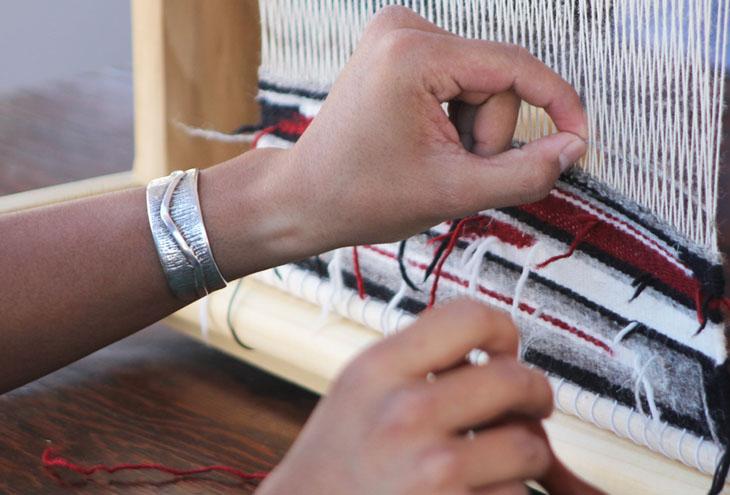The world today is full of opportunities, yet it can also be challenging to navigate. When it comes to developing effective coping strategies, Native youth have a deep resource — the traditional knowledge that kept previous generations strong through adversity.
“Culture is a great resource for Native students,” says Billie Jo Kipp, PhD, a member of the Blackfeet Nation and associate director of Research and Evaluation at the Aspen Institute Center for Native American Youth (CNAY). “Our ancestors embodied resiliency. American Indian values and behaviors have always helped us deal with difficulty and continue to grow.” Kipp, former president of both Blackfeet Community College and California Tribal College, encourages Native youth to draw upon the “indigenous strength of belief” that guided their ancestors.
“There are gaps and inequities that American Indian students often face, and the values and beliefs of our communities can be very instructive,” says Mandy Smoker Broaddus, a practice expert in Indian education at the nonprofit organization Education Northwest. “Culture, language, and tribal identity are all protective factors, and they can help us ride waves of uncertainty when we feel like we don’t belong,” adds Smoker Broaddus, who was named 2015 National Indian Educator of the Year.
Whether you’re in high school thinking about college or actually making a transition to higher education, here are practices that can help you stay on track.
Locate your advocates.
Find people who are in a position to help and guide you — they are out there. “A role model or an advocate is really just somebody who’s looking out for you,” says Smoker Broaddus. “When I was in college, there were only a couple of other American Indian students, and there were no American Indian faculty. But I had professors who realized it was a difficult environment for me at first. They stood by me and helped me make it through the system.” If you can stay connected with your family and community as you also build a broader support network, you’ll increase your chances of making the most of your education.
Listen with intention.
Experts point out that traditionally American Indians are good storytellers and good listeners. Knowing how to carefully observe and listen can be a big asset in a new setting. “For Native folks, as we adapt to an unfamiliar culture, often we can have a feeling of not fitting in,” observes Kipp. “Students can learn a lot by watching people they admire who have a mastery of language. Most mainstream educational settings are competitive and focused on ‘doing,’ but it’s important to sit quietly sometimes and focus on fundamentals that can help us communicate.”
Talk.
It can be intimidating to speak up when you’re searching for solid ground in uncharted territory. You may need to learn new ways to dialogue. “A good place to begin is with peers and mentors who approach you with empathy and understanding,” suggests Kipp. “Your life experience may be in stark contrast with that of those around you, yet it’s just as relevant.” As Smoker Broaddus emphasizes, your experience matters. “As you allow people to get to know you, you are giving them an opportunity to learn about American Indian culture and appreciate a different and valuable point of view,” she says.
Tell yourself you belong.
By definition, transitions aren’t always easy. “The systems we encounter aren’t perfect, but they have improved over time from what they used to be,” says Smoker Broaddus. “The reason things changed for the better is that American Indian people continued to show up. By showing up, by continuing to engage even when it gets tough, we’re doing our part and making our place.” Remember to take advantage of the resources around you, reassure yourself, and talk with people who believe in you. While transitions are temporary, what you learn stays with you.
Summon patience and see the big picture.
“I tell young people that if you are in higher education or planning for it, you’ve been chosen by your ancestors,” says Kipp. “There’s a bigger calling for you.” While patience will be required, the American Indian students and graduates who came before you have shown that persistence in the face of challenge will serve you well. Let your presence be known. “This is a significant thing you’re doing for yourself and your tribe,” adds Smoker Broaddus. “Give yourself some grace and don’t allow a particular experience to hold you back. You’re making an important contribution by being there and staying on your path.”

On Topic
Zeriyah James, Diné, is a rising junior at Columbia University studying psychology and public health. She currently holds the position of AISES Representative at Columbia. James intends to bring the knowledge she’s gaining in college back to the reservation. Ultimately, she wants to blend her traditional teachings and her educational knowledge to create a positive platform for the discussion of mental health in Native communities.
Aside from classes, what else are you juggling day-to-day?
New York is an expensive city, so it was important that I found a job to help me afford my everyday necessities. When I was back at school, before the pandemic, I babysat for families near campus. It could be time consuming and it wasn’t always easy to study while I worked, but having the job allowed me to become financially stable. It also was a great opportunity to get away from the stressful environment on campus.
In what ways do you find managing your workload (and other responsibilities) stressful?
It gets stressful when I feel like I am not performing as well as I would like. I feel like a majority of my time at school is spent studying and preparing for my classes, so when it seems as if my effort is not paying off, I get stressed and overwhelmed. This is partly because when I do not perform well in one area, I dedicate extra time studying for that class. Sometimes that causes me to neglect other classes, which can add to my stress.
How do your Native traditions help manage this stress?
They help me feel like I am no longer alone in my journey. My Native traditions allow me to feel like I am back at my reservation with my family and my people. At home, on my reservation, is where I feel tranquility and protection. When I practice my Native traditions in a place that is 2,000 miles away from my home, I am taken back to a state of harmony. Stress, for me, emanates from feelings of loneliness and inundation. Before I’m overwhelmed by these emotions, I look to the stories and prayers my parents and grandparents have told me, and I use them to carry me forward.
Why is it important to you to call on Native ways to help carry your burdens — school-related or otherwise?
It is important because it is a part of my identity; it is who I am. Without my teachings and traditions, I would not be where I am today. They give me strength to continue forward. If I did not have them, I would always be in a state of worry and disarray.
How does your traditional knowledge help keep you grounded and moving on a path to your goals?
It definitely keeps me sane and gives me a sense of peace in this chaotic world. When I feel overwhelmed or that nothing is going right, I look to my traditional knowledge. I also see how much my ancestors have sacrificed for me to be where I am today, and I know I have to keep moving forward.
Who introduced these traditions to you?
My parents and grandparents have had a big impact on where my traditional knowledge comes from. The teachings have been passed down from generation to generation, and I look forward to keeping them alive in the future.
How can other students access Native coping techniques?
A lot of tribes across the country have different traditions and techniques to deal with tough times. I know it may not always be allowed in a college environment, but I would suggest that students reach out to their advisors or multicultural affairs office and discuss the importance of using Native traditions and techniques for coping during stressful and chaotic times at school. Indigenous students should not be prohibited from practicing our Native ways.














